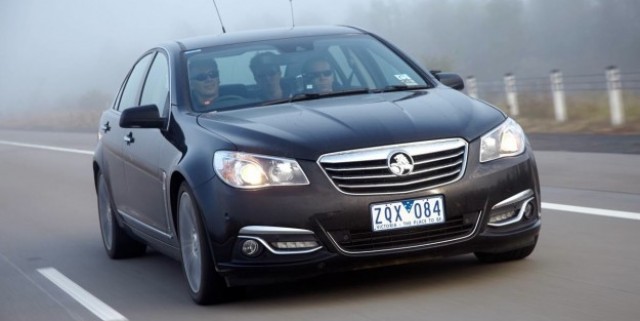
Australia's three surviving car makers have called for continued financial support, a reassessment of tariffs and trade agreements, and policy clarity in their submissions to the Federal Government's inquiry into the current state and the future of automotive manufacturing in Australia.
The Productivity Commission received 60 submissions – including those from Holden, Toyota and Ford – for consideration ahead of the release of an interim report on December 20 and the full review on March 31.
Holden's submission insists that automotive manufacturing assistance is required in two forms: investment attraction and investment return.
The car maker emphasises the effectiveness of previous government co-investment deals, which have seen Holden and parent company General Motors invest $3 for every $1 of capital assistance provided by the Federal Government.
Holden says the now-defunct Green Car Innovation Fund provided this level of assistance and "was successful in attracting foreign investment", suggesting a similar level of assistance is required going forward.
It is also supportive of the assistance provided by the Automotive Transformation Scheme (ATS) and previously the Automotive Competitive Investment Scheme, which support and encourage production and research and development activities.
"To be globally competitive with other countries which are providing perpetual assistance to their local automotive manufacturing industries, Australian automotive assistance needs to be set at appropriate levels and be ongoing," Holden's submission reads.
Holden highlights data showing that 19 of the G20 countries have automotive manufacturing at their core, and says governments of both advanced and developing economies around the world offer car makers assistance and incentives in the form of tariffs, subsidies, tax incentives, non-tariff barriers and financial grants.
It says Australia is now one of the most open automotive markets in the world, claiming an effective tariff of around three per cent after taking free trade agreements (FTAs) into account, compared with 10 per cent in the EU/UK, 25 per cent in China, 100 per cent in India, and 25 per cent for pick-up trucks in the US.
"With Australia's now negligible automotive tariff, an increasing number of FTAs, a persistently strong Australian dollar which hampers exporting, and an increasingly fragmented domestic new vehicle market, Australian automotive manufacturing has significant challenges and will require adequate levels of ongoing public assistance in order for it to remain globally competitive."
In March 2012, Holden announced a plan to produce two new cars (later revealed to be next-generation versions of the Commodore and Cruze) in a move that would shore up its local manufacturing operations until 2022, though its future beyond 2016 is once again up in the air as it renegotiates funding with the newly appointed Abbott Government, which is waiting for the findings of the Productivity Commission's review.
Toyota Australia's submission lists four key requests of the Federal Government, headed by the call for "a long-term, consistent, globally competitive policy suitable for the Australian context to attract future investment".
It describes the level of government support for the automotive industry as "modest" compared to other countries, and "reasonable" relative to support of other industries in Australia.
Toyota Australia says that for every dollar of government support it receives, it spends at least $20 in connection with manufacturing in Australia, "primarily in purchasing local parts from suppliers", and claims to have spent $1.5 billion related to building cars in Australia in 2012.
It says future fair trade agreements "must seek to address deficiencies in existing FTAs where possible and ensure similar inequalities do not arise", insists non-tariff barriers in FTA partner countries "must be addressed", and contends that a renewed focus on progressing the Australia-Gulf Cooperation Council FTA would support its exports.
Toyota also believes the automotive industry should no longer be excluded from the processes available to other importers to seek tariff concessions for components that can be proven to not be available in Australia.
It further suggests changes to industrial relations framework should be contemplated to "require industrial laws to be based at least to some degree upon productivity and flexibility gains and to set a more reasonable threshold for the definition of 'significant harm' in the context of preventing damaging industrial action".
Toyota Australia is in the early stages of its company-wide transformation, in which it aims to reduce the cost of building cars by $3800 per unit by 2018 through cost reduction strategies, flexibility and process improvements, and accelerating supplier capability development activities.
Toyota Australia is poised to make a decision on whether to close its local manufacturing operations in the first half of 2014, with its future hinging on its success in securing production of the next-generation Camry, due in 2015.
Despite announcing plans to cease vehicle production in 2016, Ford Australia submitted a number of recommendations for consideration by the Productivity Commission as it looks to its future as a design and engineering hub for its US-based parent company.
Like Holden and Toyota, Ford's key recommendations focus on the ATS – which it says should continue until 2020 with no reduction in Step 2 funding and with modifications to facilitate ongoing investment into automotive research and development – and the development of a comprehensive and fair trade strategy.
Ford says it is the largest automotive research and development investor in Australia, investing more than $200 million last year for a total investment of $1.9 billion over the past six years.
It says its successful delivery of the Ford Ranger design and engineering program enabled it to win additional product development work.
"These programs include a new Ford Ranger derivative, a significant Ford Ranger model upgrade and numerous other projects for regional and global markets in the next few years," Ford's submission reads.
"Ford Australia sees a significant and ongoing role for its product development function as a design and development Centre of Excellence for global vehicle programs given the right policy settings."
The Productivity Commission conducted public hearings of the submissions in Adelaide on Monday and in Melbourne today.




